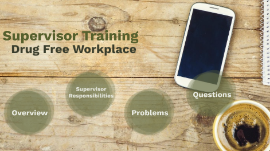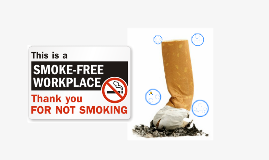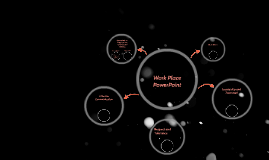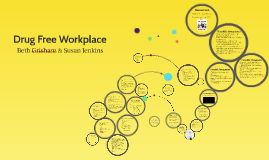Drug Free Workplace
Transcript: Possible Symptoms Beth Grisham & Susan Jenkins -High absenteeism/unexplained absences -Frequent tardiness -Personal behavioral changes or unexplained changes in personality or attitude -Sudden mood swings, irritability, or angry outbursts A threat for employers and employees alike. Among other consequences, drug abuse decreases productivity and increases accidents, absenteeism, product defects, medical and insurance costs, and employee theft. Stress on the Body Emotional symptoms of stress could include: • Becoming easily agitated, frustrated, and moody • Feeling overwhelmed, like you are losing control or need to take control • Having difficulty relaxing and quieting your mind • Feeling bad about yourself (low self-esteem), lonely, worthless, and depressed • Avoiding others Benefits of a Drug Free Workplace Possible Symptoms Cognitive symptoms of stress include: • Constant worrying • Racing thoughts • Forgetfulness and disorganization • Inability to focus • Poor judgment • Being pessimistic or seeing only the negative side Behavioral symptoms of stress include: • Changes in appetite - • Procrastinating and avoiding responsibilities • Increased use of alcohol, drugs, or cigarettes • Exhibiting more nervous behaviors, such as nail biting, fidgeting, and pacing Win, Lose or Draw -3 participants on each team -Use a notepad and colored markers -Each team will draw from the cup to determine which phrase they are sketching -Each team will have one minute to determine what is being drawn -When sketching clues, no words, numbers or letters are allowed to be drawn -Symbols, such as an arrow, exclamation point, plus sign and dollar sign, are acceptable -Sketchers cannot speak while they are drawing -An ear can be drawn to convey the words "sounds like" next to a sketch of a word that rhymes Physical symptoms of stress include: • Low energy • Headaches • Upset stomach, including diarrhea, constipation, and nausea • Aches, pains, and tense muscles • Chest pain and rapid heartbeat • Insomnia • Frequent colds and infections • Loss of sexual desire and/or ability • Nervousness and shaking, ringing in the ear, cold or sweaty hands and feet • Dry mouth and difficulty swallowing • Clenched jaw and grinding teeth Possible Symptoms -Inconsistent on-the-job performance -High accident rate/frequent small accidents resulting in minor injuries or broken objects -A sudden lack of concern over personal appearance and hygiene -Paranoia or overreaction to criticism or helpful suggestions -An unwillingness to talk about hobbies, family life, or personal interests in someone who was forthcoming before Commitment to all their employees, including the vast majority who are not and will not become drug abusers Responsibility to protect employees and employees’ rights goes far beyond protecting the rights of those who choose to engage in illicit drug use Employers not only have a right to strive to maintain a workplace free from drug abuse, they have a duty to do so Drug Free Workplace Awareness NMRC Policy • Stress means different things to different people. -What causes stress in one person may be of little concern to another. -Some people are better able to handle stress than others. -Not all stress is bad. -In small doses, stress can help you accomplish tasks and prevent you from getting hurt. -We are not equipped to handle long-term, chronic stress without ill consequences. Employee Rights Risks: Substance-abuse problems pose an enormous risk to public health and safety, and have substantial social and economic costs and consequences. What Is Stress? • Stress is the body's reaction to harmful situations -- whether they’re real or perceived. • When you feel threatened, a chemical reaction occurs in your body that allows you to act in a way to prevent injury. -This reaction is known as "fight-or-flight,” or the stress response. • heart rate increases, • breathing quickens, • muscles tighten, • blood pressure rises. Resources -Greater safety for all employees -Fewer instances of accidents and safety violence -More likely to make logical decisions to follow safety guidelines and to react effectively when accidents occur Stand Alone Policy EMP010: Employees are not under the influence of chemical substances, either legal or illegal, which might impair their performance and to comply with applicable federal and state laws/guidelines as outlined the Mississippi State Employee Handbook and the Department of Mental Health Addendum to such in all employment matters. As a program under the DMH, NMRC is also under the purview of the Mississippi State Personnel Board and their employment policy and procedures. -More positive attitudes and the overall work culture is better -Lower level of absenteeism -Focused, positive coworkers better to work with in teams and provide more support -Less propensity for health issues or need for substance abuse programs -Drug-free employers can also save on worker's compensation insurance Additional NMRC policies

















